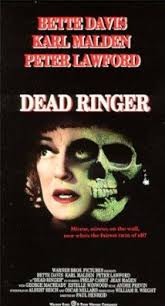
DEAD RINGER
US, 1964, 116 minutes, Black and white.
Bette Davis, Karl Malden, Peter Lawford, Philip Carey, Jean Hagen, Estelle Winwood, George Chandler, Cyril Delevanti.
Directed by Paul Henreid.
Dead Ringer is a Bette Davis vehicle of the early '60s and followed on her success in Whatever Happened To Baby Jane?. She was to capitalise on this horror style in such films as The Nanny, Hush Hush Sweet Charlotte and The Anniversary.
The film recaptures many of the old Bette Davis films and capitalises on her image and audience response to it. For the first half-hour or so, she plays twins and the audience gets two Bette Davises for the price of one. The screenplay is unremarkable though fascinating in its story of one twin murdering the other and assuming her identity and trying to cope as a fashionably wealthy woman of Los Angeles. The melodramatics keep the audience alert and interested. There is substantial support from a cast led by Karl Malden with a rush-on chatty cameo by Jean Hagen and an arch eyebrow-raised performance by Estelle Winwood. Direction is by Paul Henreid who starred with Bette Davis in Now Voyager. Andre Previn wrote a satisfactorily strident score. A reasonable example of the star's work in a new phase of her career.
1. Entertainment value of this kind of thriller? The film as a star vehicle? The conventions of Bette Davis' films and her screen persona? Audience enjoyment of them? The subduing of plot and characterisation to the personality of the star?
2. Black and white photography, the atmosphere of Los Angeles - both seedy and wealthy? Location photography in the cocktail lounges, rich estates, cemeteries, golf clubs etc.? Andre Previn's loud score? The special effects - especially with the sequences of Bette Davis as twins?
3. The conventions of the assumed identity thriller? The personalities of the two women? Motivation, confrontation, violence? The assumed identity and the pitfalls and the devices used to avoid them? The unmasking and its threats? The final nobility of the heroine - in some kind of atonement for her evil?
4. The plausibility of the plot - the antagonism of the two sisters, Edith in love with Frank and Margaret luring him away, her lies about the child? The 18 years estrangement? Edith and her struggles for survival? Her friendship with Sergeant Hobson? The reaction to seeing Margaret? The discovery of the truth? The arranging of the murder and the quick assuming of the identity? Her passing for Margaret in the household, in society? Hurting her hand, avoiding golf? The final unmasking and her preserving Margaret's identity? Would this be possible? Plausible for the purposes of the thriller?
5. Bette Davis' style as the aristocratic and self-centred Margaret, as the dowdy Edith? The funeral, the interchange after the funeral, Edith and the threats about providing the money, her avoiding Jim, the murder? The audience's knowledge of Edith and her dowdiness and manner? The probability of her assuming Margaret's identity? Assuming the haughty manner, getting used to the affluent style, changes of habit e.g. smoking, her relationship with Thor? The maid and the butler and their suspicions? Coping with the family? Coping with the police? The friends, especially Dede Marshall and the party? Paul Harrison and the signing of documents? The encounter with Tony Collins and the truth? The jewellery and her being blackmailed? His death? The irony of Margaret's collusion with Tony to murder Frank? The arrest and her confession to Jim? His non-acceptance of it and her continuing to deceive him after the trial? Her passive submission to the trial and to her execution? The plausibility of characterisation with the conventions of this thriller?
6. Karl Malden's stolid support as Sergeant Hobson? Friendship for Edith, devotion to her, the dollar bill? His suspicions of Margaret? His rejection of Edith's confession? His being left in his illusions? His searching Tony Collins' apartment after the encounter? A sketch of the conventional policeman?
7. Tony Collins as playboy - at the party, his advances towards Edith and her coping with them, her pretence to be Margaret, his believing her but suspicions, the realisation of the truth, the blackmailing, his death? A quick sketch of a playboy scoundrel?
8. The minor characters and their contribution and atmosphere - Dede and her high society chatter, the matriarch and her comments on the position of the Delorca family in Los Angeles, the Catholic overtones- Bishop, Rosahes, approval of behaviour? Paul Harrison and the signing of documents? Henry and his fidelity in the household, asking what to say at the trial? Janet and her serving of Margaret and Edith? The atmosphere of Edith's bar and the musicians, the money-collector?
9. The melodramatics - the confrontation of the two sisters and their contrast in styles? The various tense sequences for Edith to preserve Margaret's identity? Tony Collins' death? The court case and the collage of photos of Edith at the trial and the testimony?
10. Themes of human motivation, disappointment and bitterness, family quarrels? Desperation, greed? Blackmail and amorality? Satisfying ingredients for a thriller?